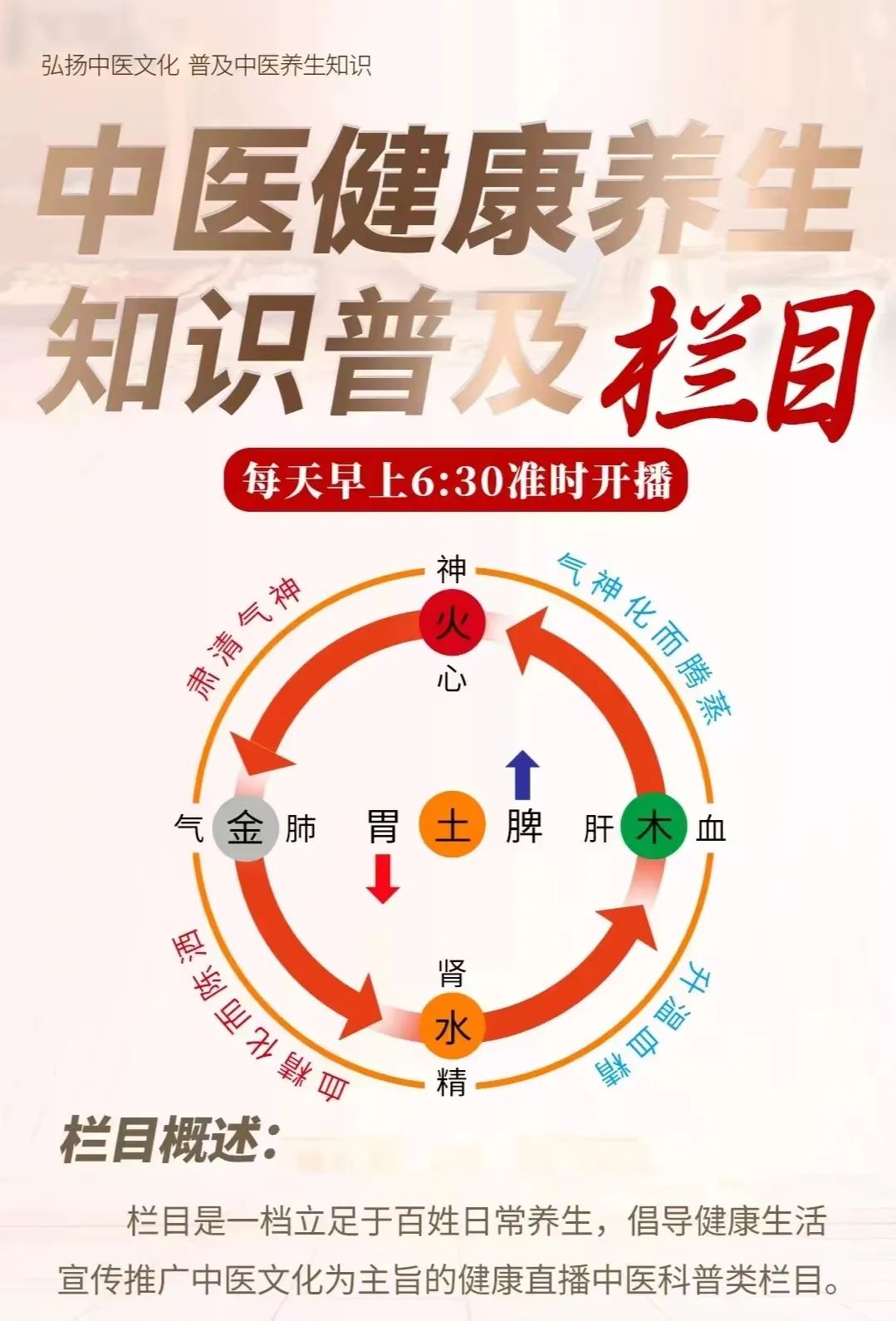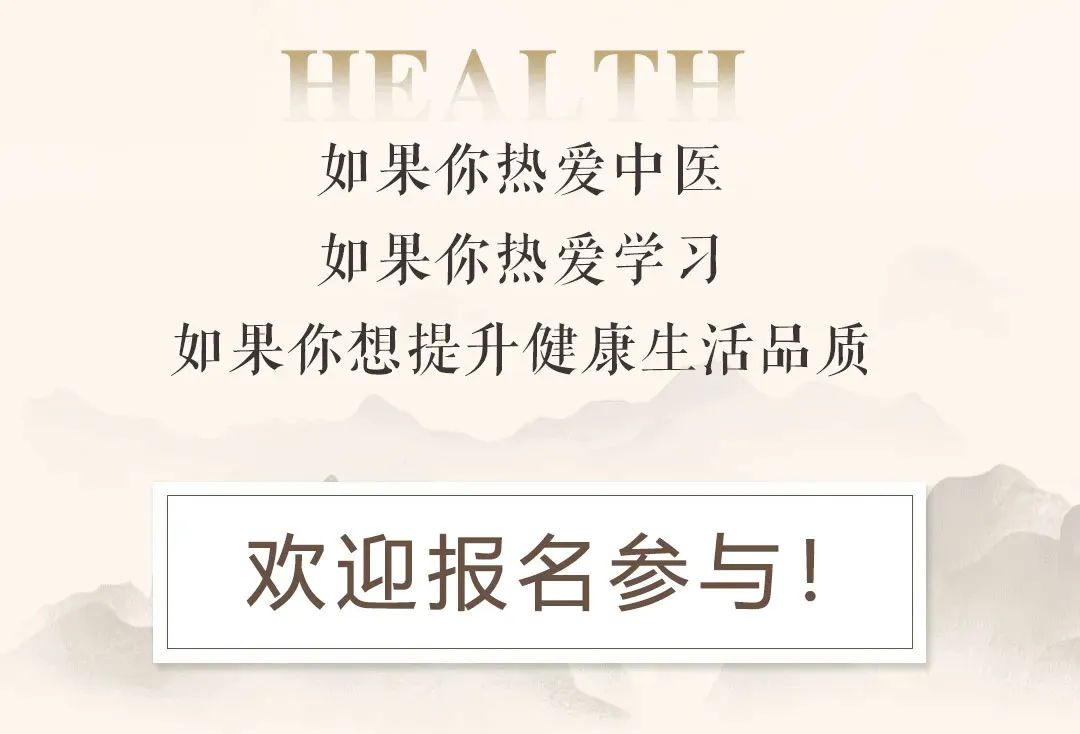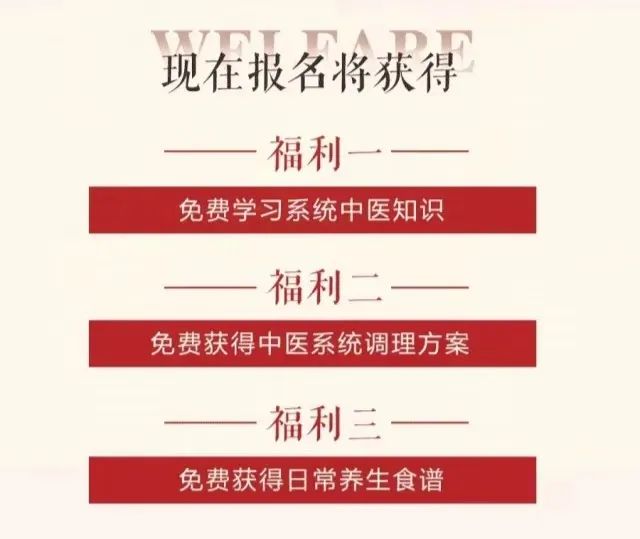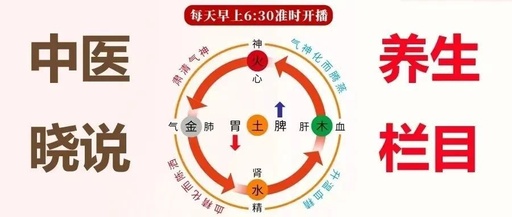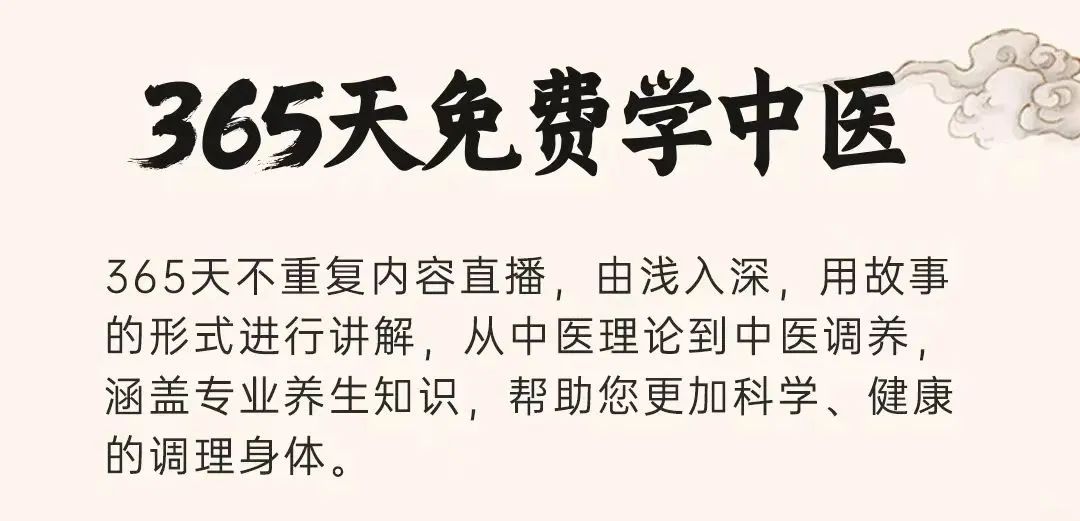
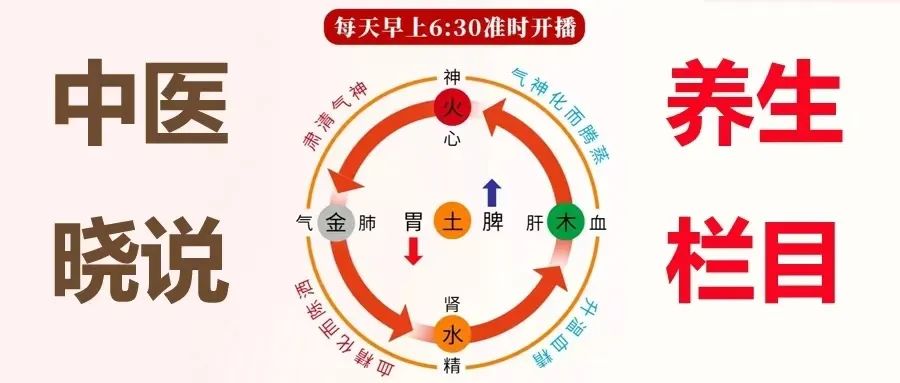
In the fast-paced modern life, many people often feel exhausted but cannot pinpoint the exact discomfort. In fact, this may be a signal from the body indicating that either Kidney Yin Deficiency (shèn yīn xū) or Kidney Yang Deficiency (shèn yáng xū) is quietly approaching. Today, let us unveil their mysteries and find the appropriate remedies to rejuvenate the body!
1. Kidney Yin Deficiency: A “Chain Reaction” of Insufficient Qi and Blood
Kidney Yin Deficiency sounds technical, but it is often the end result of insufficient Qi and blood in the body. Qi and blood are like the body’s “energy source”; when their storage is inadequate, various systems in the body experience a “power shortage,” leading to Yin deficiency. The causes of insufficient Qi and blood are diverse, but they mainly relate to the two vital organs: the Spleen (pí) and the Kidney (shèn).
The Spleen is the foundation of postnatal health, responsible for transforming food essence into Qi and blood. If the Spleen’s function is poor, such as from irregular eating habits, excessive fatigue, or overthinking, it can lead to a lack of Qi and blood production, resulting in Kidney Yin Deficiency. The Kidney is the foundation of prenatal health, where essence is stored; when Kidney essence is deficient, it also leads to insufficient Kidney Yin. This chain reaction is like a domino effect; once it starts, various discomforts will arise in the body.
Symptoms of Kidney Yin Deficiency are varied, commonly including soreness in the lower back and knees, dizziness, tinnitus, insomnia with vivid dreams, heat in the palms and soles, and dry mouth and throat. These symptoms may seem scattered, but they are all manifestations of insufficient Kidney Yin and internal heat. If you notice these symptoms, do not take them lightly; timely adjustment is crucial.
2. Kidney Yang Deficiency: A “Chain Reaction” of Cold Invasion
In contrast to Kidney Yin Deficiency, Kidney Yang Deficiency is primarily due to cold invading the Kidney. Kidney Yang is the root of Yang energy in the body; it acts like the body’s “engine,” driving various physiological activities. When cold invades, Kidney Yang is suppressed, preventing essence from transforming into Zheng Qi (正气), and Kidney Qi cannot be properly released. This is akin to an engine being frozen, unable to operate normally, which affects all bodily functions.
Symptoms of Kidney Yang Deficiency are also quite evident, such as sensitivity to cold, feeling cold in the hands and feet even in warm environments; soreness in the lower back and knees, feeling as if a heavy stone is pressing down; mental fatigue, inability to lift spirits, and easy exhaustion; and even issues like reduced sexual function, clear and prolonged urination, and loose stools. These symptoms reflect the cold nature of Kidney Yang Deficiency and dysfunction in warming capabilities.
3. Adjustment Methods: Targeted Treatment for Root and Branch
(1) Adjusting Kidney Yin Deficiency
For Kidney Yin Deficiency, strengthening the Spleen and nourishing the Kidney is key. First, dietary adjustments are essential. Foods that nourish Yin and support the Kidney, such as black sesame, walnuts, goji berries, Chinese yam, and lily bulbs, should be consumed more. Black sesame nourishes the Liver and Kidney, moistens dryness, and promotes bowel movements; walnuts support the Kidney and stabilize essence, warm the lungs, and relieve cough; goji berries nourish the Liver and Kidney, benefit essence, and improve vision; Chinese yam strengthens the Spleen and benefits the lungs, solidifying the Kidney and essence; lily bulbs nourish Yin, moisten the lungs, and calm the mind. These foods are not only delicious but also provide the necessary nutrients to help restore Kidney Yin.
In addition to dietary adjustments, appropriate exercise is also important. Gentle exercises such as Tai Chi and Ba Duan Jin (Eight Pieces of Brocade) can be chosen. These exercises not only strengthen the body but also regulate Qi and blood, enhancing Spleen and Kidney function. Practicing for about half an hour daily can yield excellent results.
If symptoms are more severe, one can take some Chinese herbal medicine under the guidance of a physician. Commonly used formulas include Liù Wèi Dì Huáng Wán (Six-Ingredient Rehmannia Pill) and Zhī Bǎi Dì Huáng Wán (Anemarrhena and Rehmannia Pill). These herbal medicines nourish Yin and support the Kidney, fundamentally improving symptoms of Kidney Yin Deficiency. However, it is important to note that herbal adjustments should be made according to individual constitution and condition; self-medication is not advisable.
(2) Adjusting Kidney Yang Deficiency
For Kidney Yang Deficiency, the main goal is to warm the Kidney and dispel cold. Keeping warm is the first step, especially in cold seasons, where attention should be paid to warming the lower back and feet. Wearing thicker socks and soaking feet in hot water before bed, adding herbs like Ai Ye (mugwort) and ginger, can dispel cold and promote blood circulation. The water temperature should be moderate, soaking for 15-20 minutes is sufficient.
In addition to keeping warm, external methods to dispel cold can also be utilized. For example, moxibustion is a very effective external treatment in TCM. Points such as Guān Yuán (Conception Vessel 4), Shén Què (Conception Vessel 8), and Mìng Mén (Kidney 4) can be selected for moxibustion, each session lasting 15-20 minutes, 2-3 times a week. The warm stimulation from moxibustion can open the meridians, dispel cold evil, and enhance Kidney Yang function.
Dietary adjustments are also crucial. Foods that warm Yang, such as lamb, leeks, walnuts, and chestnuts, should be consumed more. Lamb warms the center, replenishes deficiency, and nourishes Qi and blood; leeks warm the center, promote Qi movement, and dispel stasis and detoxify; walnuts support the Kidney and stabilize essence, warm the lungs, and relieve cough; chestnuts nourish the stomach, strengthen the Spleen, and support the Kidney and strengthen muscles. These foods not only replenish energy but also help the body resist cold evils.
If symptoms are more severe, one can also take some Chinese herbal medicine under the guidance of a physician. Commonly used formulas include Jīn Guì Shèn Qì Wán (Kidney Qi Pill from the Golden Cabinet) and Yòu Guī Wán (Right Return Pill). These herbal medicines warm and supplement Kidney Yang, improving symptoms of Kidney Yang Deficiency. Again, it is important to note that herbal adjustments should be made according to individual constitution and condition; self-medication is not advisable.
4. Conclusion
Although Kidney Yin Deficiency and Kidney Yang Deficiency have different symptoms, they are both warning signals from the body. Only by timely detection and correct adjustment can the body regain health. During the adjustment process, methods such as diet, exercise, external treatments, and herbal medicine can complement each other for better results. Additionally, maintaining good lifestyle habits, avoiding excessive fatigue and emotional fluctuations, is essential to fundamentally improve constitution and keep the body free from the troubles of Yin and Yang deficiency.
We hope everyone can take this seriously and start taking good care of their kidneys, allowing the body to be full of vitality and welcoming each beautiful tomorrow!
Teacher Wang Xiao continues to share【败家子和守财奴】
In daily life, how should we distinguish between Kidney Yin Deficiency and Kidney Yang Deficiency?
How do issues of heat and cold in the elderly arise?
How should we adjust for Kidney Yin Deficiency and Kidney Yang Deficiency?
Main Content
In simple terms, Kidney Yin Deficiency is often a result; any insufficiency in Qi and blood storage can lead to Yin deficiency, with various causes mainly related to the Spleen and Kidney, thus requiring Spleen strengthening and Kidney nourishing. Kidney Yang Deficiency, on the other hand, is due to cold invading the Kidney, preventing essence from transforming into Zheng Qi, and Kidney Qi from being released. Therefore, for this issue, we need to warm the Kidney, ensuring proper warmth while also utilizing external methods to dispel cold.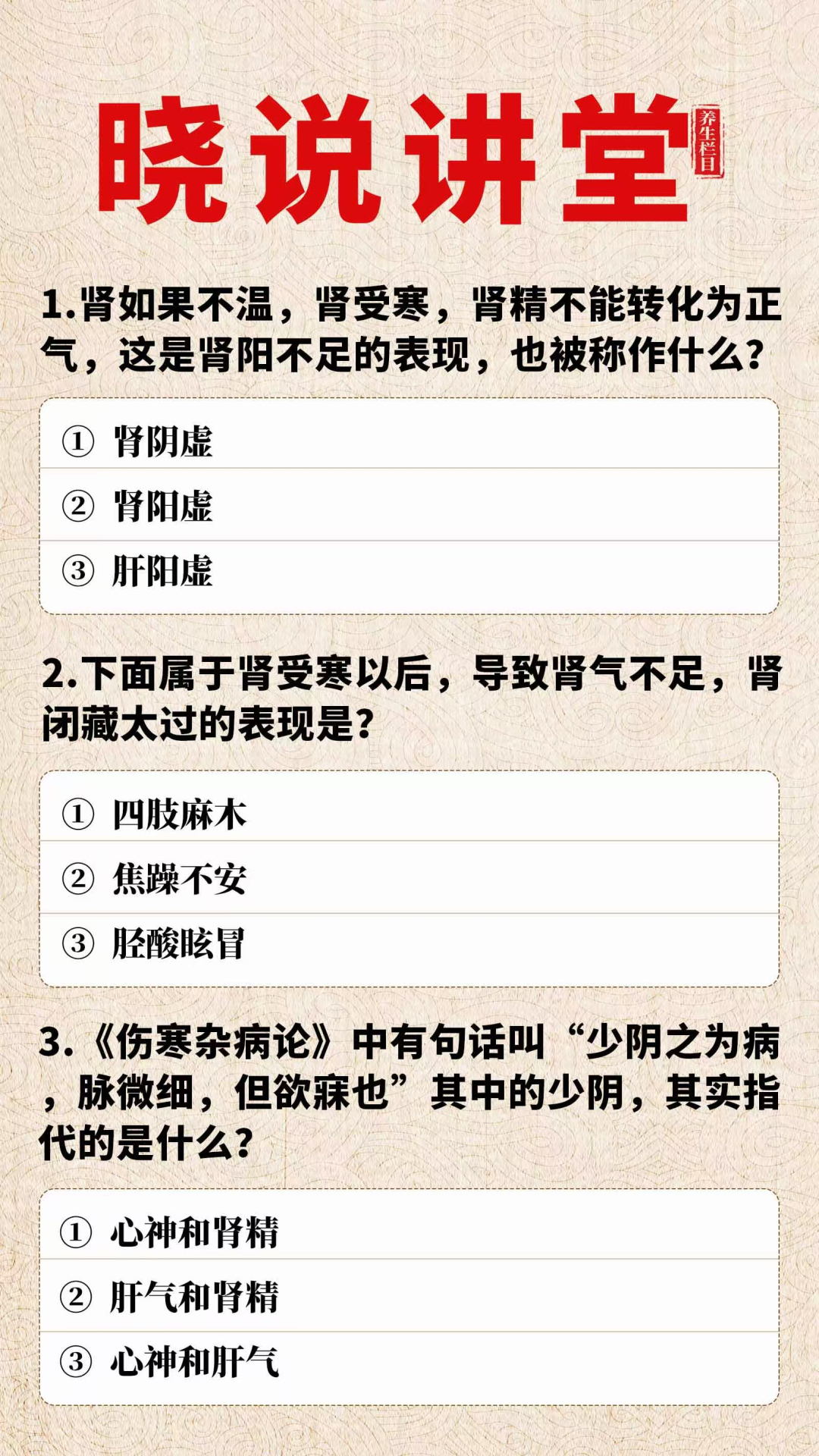
The Xiaoshui Health Public Course reveals the answers!
Question 1: The correct answer is 2⃣
For our body, to ensure that Kidney essence smoothly transforms into Qi, we need to provide heat. The Kidney must be warmed; when the Kidney is warm, the essence rises and transforms into Zheng Qi. If the Kidney is not warm and is affected by cold, Kidney essence cannot transform into Zheng Qi, which is a manifestation of Kidney Yang Deficiency, also referred to as being “stingy” with the Kidney.
Question 2: The correct answer is 3⃣
In the early manifestations of kidney disease, TCM also has a term called “calf soreness and dizziness”; calf soreness refers to the feeling of soreness in the calf bones or the calf muscles. Dizziness refers to a feeling of blackness in front of the eyes; it feels as if something is wrapped around the head, making it unclear. Calf soreness and dizziness indicate that the Kidney is affected by cold, leading to insufficient Kidney Qi, and excessive retention, a manifestation of being “stingy” with the Kidney.
Question 3: The correct answer is 1⃣
In the Shāng Hán Zá Bìng Lùn (Treatise on Cold Damage and Miscellaneous Diseases), there is a saying: “In the case of Shaoyin disease, the pulse is fine and weak, and the patient just wants to sleep.” Shaoyin corresponds to the Hand Shaoyin Heart Meridian and the Foot Shaoyin Kidney Meridian, referring to our spirit and Kidney essence. The disease of Shaoyin is characterized by a fine and weak pulse.
(End of Article)
